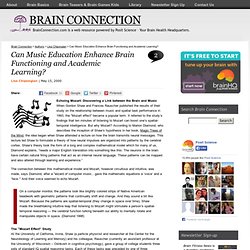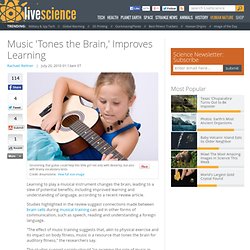

Brain Connection Can Music Education Really Enhance Brain Functioning and Academic Learning? » Brain Connection » Powered by Posit Science - Your Brain Health Headquarters. Echoing Mozart: Discovering a Link between the Brain and Music When Gordon Shaw and Frances Rauscher published the results of their study on the relationship between music and spatial task performance in 1993, the “Mozart effect” became a popular term.

It referred to the study’s findings that ten minutes of listening to Mozart can boost one’s spatial-temporal intelligence. But why Mozart? According to Marion Diamond, who describes the inception of Shaw’s hypothesis in her book, Magic Trees of the Mind, the idea began when Shaw attended a lecture on how the brain transmits neural messages. This lecture led Shaw to formulate a theory of how neural impulses are organized into patterns by the cerebral cortex. How Music Affects the Brain: Enhance Learning, Attitude, and Health. Music 'Tones the Brain,' Improves Learning. Learning to play a musical instrument changes the brain, leading to a slew of potential benefits, including improved learning and understanding of language, according to a recent review article.

Studies highlighted in the review suggest connections made between brain cells during musical training can aid in other forms of communication, such as speech, reading and understanding a foreign language. "The effect of music training suggests that, akin to physical exercise and its impact on body fitness, music is a resource that tones the brain for auditory fitness," the researchers say.
The studies suggest society should "re-examine the role of music in shaping individual development," and schools should consider boosting efforts to incorporate musical training into the curriculum, the researchers say.